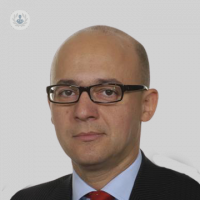COVID’s impact on thyroid disease patients and their treatment
Written in association with:COVID-19 disease was declared a global pandemic in March 2020 when the World Health Organisation recognised coronavirus COVID-19 (SARS-CoV-2) as a worldwide medical emergency. This impacted treatment across all specialities, including endocrine surgery.
Mr Radu Mihai, a renowned UK general and endocrine surgeon in Oxford, shares his professional advice concerning how endocrine disease management has been affected by the pandemic. He describes if thyroid patients are more vulnerable to catching the virus, explains who is at risk from more severe COVID complications and clarifies how blood tests and surgeries have been affected.

Can COVID-19 make thyroid disease patients more vulnerable to catching COVID?
There is no evidence that patients with existing (autoimmune) thyroid diseases (e.g. Grave’s disease) are more vulnerable when it comes to contracting viral illnesses, including the coronavirus COVID-19 (also known as SARS-CoV-2).
Antithyroid drugs (ATDs) are not known to increase the risk of infection, and patients on ATDs are not considered to be at a higher risk of contracting COVID-19.
Furthermore, patients who have completed treatment for thyroid cancer (i.e. those who already had surgery, with or without radioiodine ablation) are not considered at higher risk of infection from COVID-19.
What should thyroid disease patients know about their risk of severe COVID symptoms?
Patients with uncontrolled overactive thyroid dysfunction
Patients with uncontrolled overactive thyroid dysfunction (thyrotoxicosis) may be at higher risk of complications (e.g. thyroid storm) if they contract the COVID-19 virus. Patients with uncontrolled overactive thyroid dysfunction should continue taking their thyroid medication(s) to reduce this risk.
Previous radiotherapy
Patients who have previously received external beam radiotherapy to the neck may be at increased risk of severe illness with coronavirus and should consider self-isolating.
Hypothyroidism
Patients with hypothyroidism are advised to continue the same form and dosage of thyroid hormone replacement therapy. If there are significant weight changes or they are feeling unwell, they should have blood tests and thyroid function testing.
Hypothyroidism and pregnancy
Expecting mothers with treated hypothyroidism should continue to follow the advice to increase the dose of levothyroxine as soon as they have a positive pregnancy test e.g. by doubling the current dose of levothyroxine on two days of the week. Ideally, thyroid function should be checked using population and trimester-specific reference ranges regularly, although, in women whose thyroid function is stably controlled, the frequency of testing may be reduced, depending on available resources.
Patients on antithyroid drugs
Antithyroid drugs (ATDs) are not known to cause patients to develop more severe symptoms in the event of contracting the infection.
However, two to five in every 1000 patients taking ATDs are at risk of developing neutropenia (a low level of neutrophils - a type of white blood cell) or agranulocytosis (a rare, drug-induced blood disorder of reduced white blood cells), they might develop symptoms that overlap with the symptoms of COVID-19, such as:
- sore throat
- mouth ulceration
- fever and flu-like illness
- a new continuous cough
It is difficult, if not impossible, for patients and physicians to distinguish between these two diagnoses clinically. Since ATD-induced neutropenia is associated with increased risk of infections, patients should be aware of these risks and ask for medical advice in case of concerns.
Thyroid eye disease (Grave’s ophthalmopathy)
A particular subgroup of Grave’s disease patients with an increased risk is those with a thyroid eye disease (also called Grave’s ophthalmopathy) on immunosuppressive medication. This includes patients on glucocorticoids at immunosuppressive doses as well as those on other immunosuppressive agents (e.g. mycophenolate, azathioprine, teprotumumab, rituximab and tocilizumab). These patients should be advised to self-isolate for at least 12 weeks and should observe general advice for avoiding the progression of ophthalmopathy during this pandemic, such as stopping cigarette smoking and/or selenium supplementation.
Patients with thyroid eye disease who develop COVID-19 may represent a significant risk of infection, especially if they have prominent ocular soft tissue involvement. Patients with thyroid eye disease should be advised to avoid tear drop leakage and careful adherence to personal protective equipment guidance is advised for healthcare professionals who are involved in their management.
If I need to have blood tests for Graves’ disease but need to self-isolate, what should I do?
If you are due to have routine blood tests and 1) you are feeling well and 2) the current dose of medication has been stable for many months, then the blood tests can be postponed.
If you are feeling unwell, you can still have the blood tests done. Most hospitals have organised facilities for phlebotomy services running, and with facilities to observe social distancing and limited interactions with other patients or medical staff.
What delays has COVID caused for thyroid surgeries?
At the beginning of the pandemic, the BAETS (British Association of Endocrine and Thyroid Surgeons) has issued advice on the timing for elective thyroid surgery.
It was deemed acceptable to offer urgent surgery (i.e. necessary within four weeks) only to patients with:
- An airway obstruction (i.e. compression of the windpipe by large tumour or a goitre )
- Aggressive tumours (e.g. an undifferentiated/poorly differentiated thyroid cancer or medullary thyroid cancer)
- Locally advanced thyroid cancers with nodal involvement
- Uncontrolled thyrotoxicosis
- Sight-threatening thyroid eye disease
Then there are some surgeries for other thyroid cancers that can be delayed for up to three months with no predicted negative outcome.
Surgery for uncomplicated benign thyroid disease has been delayed by more than three months with no predicted negative outcomes. However, because of the backlog of cases that have accumulated during the pandemic, such operations will likely be delayed by significantly more than three months.
Mr Radu Mihai’s first-class patient care is available via video and face-to-face consultations. Learn how he can help you and arrange your appointment.


